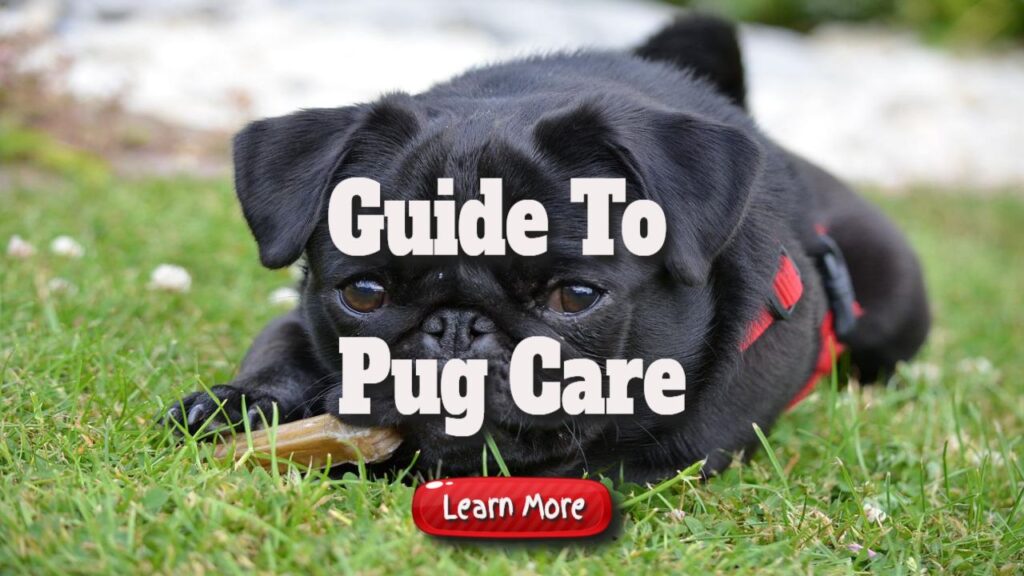Guide To Pug Care
Guide to Pug Care Pugs are cute little critters with a distinct appearance. They may be insignificant and entertaining, but you must recognise and address their specific needs to ensure their health and well-being.
Everyone who owns or plans to acquire a pug should read our pug care guide.
Pugs are often recognised as one of the most popular dog breeds due to their unique personality and appearance. Some people like larger dogs, while others prefer fluffy white canines that don’t shed, but we can all agree that a pug always gets all the attention.
Whatever they accomplish, their facial expressions and funny approaches place them at the forefront. Anyone who has owned or lived with a pug will understand exactly what we mean.
Puppies can generate many amusing disasters for individuals who own or plan to get one.
However, regardless of how much they can entertain and lighten your day, you must know how to properly care for your Pug and offer them the best life possible.
Although these dogs will go out of their way for their owner’s attention, they require special care to be happy and healthy.
Due to their distinctive physical characteristics, pugs require a little additional attention from their owners to be completely healthy and clean.
Don’t worry if you’re acquiring a pug for the first time and aren’t sure what to do or how often to groom your dog; we’re here to help.
We will assist you at every stage of keeping your Pug healthy. This book may also be useful to owners of Pug cross breeds such as Puggles, Chihuahua Pugs, Frug, Pom-A-Pugs, Daugs, and others who have inherited many Pug qualities.
Buying food for your Pug
Pugs, like all dogs, enjoy eating. The big difference is the amount of activity each dog gets. Pugs aren’t the most active dog breeds in general, and if they don’t get enough exercise, they can become actual couch potatoes.
That is why it is vital to maintain your Pug’s rations.
Feed your adult pug once or twice a day, according to the suggested meal size.
You may help your pug puppy’s development by feeding him appropriate food for his age. Puppies have different nutritional needs than adults and older dogs.
As a result, please consider your puppy’s dietary needs based on his activity level and age.
Adjusting your dog’s diet over time may be required to prevent him from developing food intolerances.
Another reason to reconsider your Pug’s diet is if you notice him gaining weight. In this case, you should consider boosting your dog’s daily activity and examining his daily caloric intake.
However, remember that Pugs are brachycephalic breeds, which are more prone to respiratory issues and might worsen if they are overweight.
Another consideration for Pug owners is how many goodies they give their dogs. Because Pugs are little dog breeds, the number of treats they can consume during the day is significantly less than that of a medium-sized dog.
Treats should not constitute more than 10% of your dog’s daily caloric intake.
Pug exercise is essential.
Getting adequate exercise for your dog is the best way to keep him happy and healthy. Regular exercise and keeping your Pug in shape are necessary if you want a peaceful, satisfied pet that will not develop more prevalent behavioural disorders.
An adult Pug needs two 15-20 minute periods of moderate exercise per day. They like playing as well. Having a variety of toys at home helps keep your Pug physically and psychologically stimulated.
It would be ideal if you also spent time playing with your Pug daily. You and your Pug can chase each other around the house or play fetch, and your Pug will undoubtedly join in on the fun.
Exercise is essential for all dogs, but it might be difficult for brachycephalic breeds.
Their flat noses may fail to cool down after strenuous exercise, putting them at risk of heat stroke.
Furthermore, walking on a humid and hot day may cause breathing difficulties and overheat.
As a result, you should be aware of when to lessen the intensity of your workout significantly.
Appropriate walking equipment
A pug, unlike larger dogs, requires a harness rather than a collar when walking. Collars would make the Pug’s already challenging breathing much more difficult, something you would wish to avoid.
Make sure you have a leash that allows you to walk your Pug on a busy, narrow sidewalk and in the park’s vast fields.
You may also train your Pug more efficiently using the proper leash and harness.
Instructions for Pugs
Pugs usually respond well to basic training. Although they may not be interested in detailed training, learning basic commands should be simple because these dogs enjoy pleasing their owners.
To guarantee that your dog genuinely learns what you are attempting to teach him, you must be nice, patient, and persistent during training, just like you would with any other dog.
According to all modern dog behaviourists, positive reinforcement is the most effective strategy. You can easily employ this strategy by rewarding your Pug with goodies when they perfectly obey a command.
However, while you should avoid overfeeding your dog with treats, remember that simple praise after your dog has been well-behaved is enough incentive.
However, remember that teaching your dog entails more than simply repeating the command until you’re out of breath. To train a dog effectively, you must first understand how to engage with your pet.
You can know when it is time to train your dog and whether he is offended by something if you understand his body language.
Training any dog, especially pugs, will be much easier if you study human-dog communication.
If you’re new to dog ownership and having problems dealing with your dog’s misbehaviour or teaching him directions, consider enrolling your Pug in an obedience class.
In this manner, you may learn how to properly manage your dog while bonding with him.
The post Guide To Pug Care appeared first on https://gqcentral.co.uk



